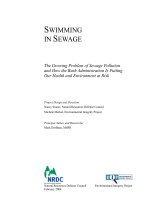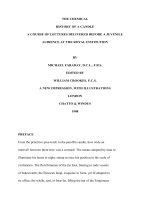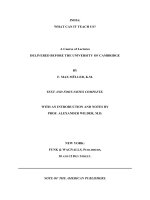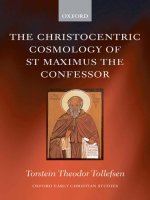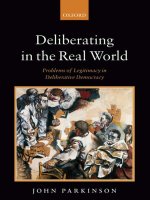- Trang chủ >>
- Khoa Học Tự Nhiên >>
- Vật lý
the problem of evil the gifford lectures delivered in the university of st andrews in 2003 aug 2006
Bạn đang xem bản rút gọn của tài liệu. Xem và tải ngay bản đầy đủ của tài liệu tại đây (874.49 KB, 198 trang )
THE PROBLEM OF EVIL
This page intentionally left blank
The Problem of Evil
The Gifford Lectures Delivered in the
University of St Andrews in 2003
PETER VAN INWAGEN
1
1
Great Clarendon Street, Oxford OX2 6DP
Oxford University Press is a department of the University of Oxford.
It furthers the University’s objective of excellence in research, scholarship,
and education by publishing worldwide in
Oxford New York
Auckland Cape Town Dar es Salaam Hong Kong Karachi
Kuala Lumpur Madrid Melbourne Mexico City Nairobi
New Delhi Shanghai Taipei Toronto
With offices in
Argentina Austria Brazil Chile Czech Republic France Greece
Guatemala Hungary Italy Japan Poland Portugal Singapore
South Korea Switzerland Thailand Turkey Ukraine Vietnam
Oxford is a registered trademark of Oxford University Press
in the UK and in certain other countries
Published in the United States
by Oxford University Press Inc., New York
Peter van Inwagen 2006
The moral rights of the author have been asserted
Database right Oxford University Press (maker)
First published 2006
All rights reserved. No part of this publication may be reproduced,
stored in a retrieval system, or transmitted, in any form or by any means,
without the prior permission in writing of Oxford University Press,
or as expressly permitted by law, or under terms agreed with the appropriate
reprographics rights organization. Enquiries concerning reproduction
outside the scope of the above should be sent to the Rights Department,
Oxford University Press, at the address above
You must not circulate this book in any other binding or cover
and you must impose the same condition on any acquirer
British Library Cataloguing in Publication Data
Data available
Library of Congress Cataloging in Publication Data
Van Inwagen, Peter.
The problem of evil : the Gifford lectures delivered in the University of St.
Andrews in 2003 / Peter van Inwagen.
p. cm.
Includes bibliographical references (p. ) and index.
ISBN-13: 978-0-19-924560-4 (alk. paper)
ISBN-10: 0-19-924560-6 (alk. paper)
1. God—Proof. 2. Good and evil—Religious aspects—Christianity. 3. Theodicy. I. Title.
BT103.V35 2006 214—dc22 2006006153
Typeset by Laserwords Private Limited, Chennai, India
Printed in Great Britain
on acid-free paper by
Biddles Ltd., King’s Lynn, Norfolk
ISBN 0–19–924560–6 978–0–19–924560–4
13579108642
For Lisette
This page intentionally left blank
Preface
These lectures were delivered in the University of St Andrews in April
and May of 2003. It is difficult for me to find words to express my
gratitude to the members of University of St Andrews for giving me the
opportunity to deliver a series of Gifford Lectures in their university.
Having attempted and discarded several more elaborate expressions of
gratitude, I will say only that I am very grateful indeed for the honor
they have done me. I am also grateful to many individual members of
the university for all they did to make my stay in St Andrews a pleasant
and productive one, and for their many acts of kindness to me and to
my wife Lisette and my step-daughter Claire. Special thanks are due
to Professor Alan Torrance, Dr Peter Clark (Head of the School of
Philosophical and Anthropological Studies), Professor Sarah Broadie,
and Professor John Haldane. I wish also to thank the audiences at the
lectures for their insightful comments and questions, many of which I
have responded to (however inadequately) in this book. These responses
are to be found in the endnotes; in a few cases, they have taken the form
of revisions of the text of the lectures. Finally, I thank the two readers
to whom the Oxford University Press sent a draft of the manuscript of
this book. I have tried to meet some of their concerns about particular
passages (and I have responded to some of their more general comments
and suggestions) in the notes and in the text.
I have not, in turning the text of the lectures into a book, tried to
make it anything other than what it was: a text written to be read aloud
to an audience. (With this qualification: in the process of revision, some
of the ‘‘lectures’’ have become too long actually to be read in the hour
that academic tradition allots to a lecture.) Many passages in the text
of the lectures have been extensively rewritten, but all the revisions are
ones I would have made before the lectures were delivered—i f only I
had been thinking more clearly at the time.
Most of the material in this book that was not in the original lectures
is in the endnotes. The lectures were written for a general audience (as
opposed to an audience of philosophers). A few of the notes are simply
thoughts that could not be fitted into the text without ‘‘breaking the
flow’’. Most of the others (citations of books and articles aside) are for
philosophers. I advise readers of the book who are not philosophers to
viii Preface
ignore the notes (unless, perhaps, they see a footnote cue attached to a
passage in which something I’ve said seems to them to face an obvious
objection; they may find their concern addressed in the note).
I will not summarize the content of the lectures here. The Detailed
Contents contains a summary of each of the lectures, and the first lecture
gives a general overview of their content.
Citations are given in ‘‘minimal’’ form in the notes (e.g. Adams and
Adams, The Problem of Evil). For ‘‘full’’ citations, see Works Cited.
Quotations from the Psalms are taken from the Book of Common
Prayer. Other biblical quotations are from the Authorized (King James)
Version unless otherwise specified.
P I
South Bend, Indiana
August 2005
Outline Contents
Detailed Contents xi
Lecture 1. The Problem of Evil and the Argument from Evil 1
Lecture 2. The Idea of God 18
Lecture 3. Philosophical Failure 37
Lecture 4. The Global Argument from Evil 56
Lecture 5. The Global Argument Continued 75
Lecture 6. The Local Argument from Evil 95
Lecture 7. The Sufferings of Beasts 113
Lecture 8. The Hiddenness of God 135
Notes 152
Works Cited 177
Index 181
This page intentionally left blank
Detailed Contents
LECTURE I. THE PROBLEM OF EVIL AND THE
ARGUMENT FROM EVIL
In this lecture, I defend my approach to the problem of evil: my
decision to approach the problem of evil by way of an examination of
the argument from evil. I distinguish several different ‘‘problems of evil’’
and several different ‘‘arguments from evil’’. I examine the contention
that there is an ‘‘overarching’’ problem of evil, a problem that confronts
both theists and atheists, and conclude that this contention is simply
false.
LECTURE II. THE IDEA OF GOD
I present a more or less traditional list of the ‘‘divine attributes’’ and
conclude that this list represents an attempt to flesh out the Anselmian
notion of a ‘‘something than which a greater cannot be conceived’’. I
contend that the concept of God should be understood in this Anselmian
sense, and that it is implausible to suppose that a ‘‘something than which
a greater cannot be conceived’’ should lack any of the attributes in the
traditional list. I raise and t ry to answer the question: To what extent
is it possible to revise the traditional list of divine attributes without
thereby replacing the concept of God with another concept?
LECTURE III. PHILOSOPHICAL FAILURE
My thesis in these lectures is that the argument from evil is a failure.
But what is it for a philosophical argument to fail? I propose that a
philosophical argument fails if it cannot pass a certain test. The test
is the ability of the argument to win assent from the members of
a neutral audience who have listened to an ideal presentation of the
argument. That is: the argument is presented by an ideal proponent
of the argument to an ideal audience whose members, initially, have
no tendency either to accept or to reject its conclusion; the proponent
lays out the argument in the presence of an ideal critic whose brief it is
to point out any weaknesses it may have to the audience of ‘‘ideal
xii Detailed Contents
agnostics’’. If—given world enough and time—the proponent of the
argument is unable to use the argument to convince the audience that
they should accept its conclusion, the argument is a failure.
LECTURE IV. THE GLOBAL ARGUMENT FROM EVIL
The global argument from evil proceeds from a premise about the
totality of the evil (primarily the suffering) that actually exists. Having
examined and refuted the popular contention that there is something
morally objectionable about treating the argument from evil as ‘‘just
one more philosophical argument’’, I imagine this argument presented
to an audience of ideal agnostics, and the beginnings of an exchange
between Atheist, an idealized proponent of the argument, and Theist, an
idealized critic of the argument. The idea of a ‘‘defense’’ is introduced:
that is, the idea of a story that contains both God and all the evils that
actually exist, a story that is put forward not as true but as ‘‘true for
all anyone knows’’. I represent Theist as employing a version of the
‘‘free-will defense’’, a story according to which the evils of the world
result from the abuse of free will by created beings.
LECTURE V. THE GLOBAL ARGUMENT
CONTINUED
I begin with an examination of three philosophical theses about free
will, each of which would, if it were true, refute or raise difficulties
for Theist’s attempt to reply to the argument from evil by employing
the free-will defense: that free will is compatible with determinism;
that an omniscient being would know what anyone would freely do
in any counterfactual circumstances; that free will is incompatible with
divine foreknowledge. Having shown how Theist can show that these
theses are doubtful (Theist’s use of the free-will defense does not require
him to refute the theses), I pass on to a consideration of one of the
sharpest arrows in Atheist’s quiver, ‘‘natural evil’’—that is, suffering
due to natural events that are not caused by acts of human will, free
or unfree. I represent Theist as employing a version of the free-will
defense that supposes a primordial separation of our remote ancestors
from God, and as defending the conclusion that, according to this story,
the suffering of human beings that is caused proximately by, e.g., floods
and earthquakes, can also be remotely caused by the abuse of free will.
Detailed Contents xiii
I invite my audience to consider carefully the question whether ‘‘ideal
agnostics’’ would indeed react to this story by saying, ‘‘That story is true
for all we know’’.
LECTURE VI. THE LOCAL ARGUMENT FROM EVIL
Local arguments from evil proceed not from a premise about ‘‘all
theevilsoftheworld’’,butfromapremiseaboutasinglehorrible
event. They take the form, ‘‘If there were a God, that would not have
happened’’. (There are, of course, vastly many events on which such an
argument could be based. Because, the ‘‘logic’’ of every such argument
is the same, however, I gather all of them together under the rubric ‘‘the
local argument from evil’’.) I defend the conclusion that even if Theist’s
arguments in the two previous lectures are indisputably correct, they do
not refute the local argument, which is really an argument of a quite
different kind. But I go on to say that if Theist’s response to the global
argument is accepted, it provides materials from which a reply to the
local argument can be constructed. This reply, oddly enough, turns on
considerations of vagueness much like those considered in philosophical
discussions of the sorites paradox.
LECTURE VII. THE SUFFERINGS OF BEASTS
Since there were non-rational but sentient organisms long before there
were human beings, the free-will defense cannot account for the suf-
ferings of those organisms. (At one time, it might have been possible
to say that the sufferings of beasts were due entirely to a corruption of
nature that was consequent on our first ancestors’ separating themselves
from God. It is obviously no longer possible.) I present a defense (in
no way related to the free-will defense) that purports to account for
the sufferings of pre-human beasts and all the more recent sufferings of
beasts that cannot be ascribed to the abuse of free will by human beings.
I finally consider some problems that confront anyone who (as I have
done) employs both this second defense and the free-will defense.
LECTURE VIII. THE HIDDENNESS OF GOD
The problem of evil can sometimes seem to be a special case of a
more general problem, the seeming absence of God from the world, the
conviction that some people sometimes feel that, if there is a God at all,
xiv Detailed Contents
he is ‘‘hidden’’. In this lecture, I raise the question: What does it mean,
what could it mean, to say that God is hidden? The answer to this
question, as I see it, turns on an understanding of the divine attribute of
omnipresence. Consideration of the implications of the omnipresence of
God shows that there can be only one sense in which God is ‘‘hidden’’:
he does not present human beings with (or at least presents very few of
them with) unmistakable evidence of his existence in the form of ‘‘signs
and wonders’’. The fact that God does not present all human beings
with such evidence suggests an argument for the non-existence of God
that is of the same form as the global argument from evil: ‘‘If there were
a God, he would present all human beings with unmistakable evidence
of his existence in the form of signs and wonders. And yet no such
evidence exists. There is, therefore, no God.’’ I present a response to this
argument that is parallel to my response to the global argument from
evil in Lectures 4 and 5.
Lecture 1
The Problem of Evil and the Argument
from Evil
Like most Gifford lecturers, I have spent some time with Lord Gifford’s
will and with past Gifford Lectures. The topic of lectures supported by
Lord Gifford’s bequest was to be:
Natural Theology in the widest sense of that term, in other words, ‘The
Knowledge of God, the Infinite, the All, the First and Only Cause, the One
and Sole Substance, the Sole Being, the Sole Reality, and the Sole Existence,
the Knowledge of His Nature and Attributes, the Knowledge of the Relations
which men and the whole universe bear to Him, the Knowledge of the Nature
and Foundation of Ethics or Morals, and of all Obligations and Duties thence
arising’.
1
Moreover
I wish the lecturers to treat their subject as a strictly natural science, the greatest
of all possible sciences, indeed, in one sense, the only science, that of Infinite
Being, without reference to or reliance upon any supposed special exceptional
or so-called miraculous revelation. I wish it considered just as astronomy or
chemistry is.
2
I am not unusual among Gifford lecturers in that I find myself unable
to meet these terms. I cannot meet them because I do not think that
natural theology exists; not, at any rate, if natural theology is understood
as a science that draws conclusions about an infinite being—a perfect
substance, a first and only cause of all things—f rom the data of the
senses, and draws these conclusions with the same degree of assurance as
that with which natural science draws conclusions about red dwarf stars
and photosynthesis from the data of the senses. I do not have, as Kant
thought he had, general, theoretical reasons for thinking that natural
theology, so defined, is impossible. It’s just that I don’t think I’ve ever
seen it done successfully—and I know that I don’t know how to do
it. Having had a standard philosophical education, I have of course
2 The Problem and Argument from Evil
seen lots of arguments that, if they were as compelling as arguments in
the natural sciences sometimes manage to be, would establish natural
theology as a going concern. But, having examined these arguments
individually, having considered each on its own merits, I have to say that
I find that none of them lends the kind of support to its conclusion that
the arguments of astronomers and chemists sometimes—frequently, in
fact—lend to their conclusions. And this, I would say, is no more than
a special case of a rather depressing general truth about which I shall
have something to say in the third lecture: no philosophical argument
that has ever been devised for any substantive thesis is capable of lending
the same sort of support to its conclusion that scientific arguments often
lend to theirs. (Natural theology, whatever else it may be, is a part of
philosophy.)
What, then, am I to talk about if these lectures are not simply to
flout the terms laid down in Lord Gifford’s will? I might talk about
the arguments I have alluded to (the ontological argument, say, or the
cosmological argument) and try to say what I think their strengths and
weaknesses are (for I do think they have strengths as well as weaknesses).
If I were to do that, I should be as faithful to Lord Gifford’s conditions
as most Gifford lecturers have managed to be. I have decided, however,
to try something else. I am going to discuss the argument from evil, the
most important argument for the non-existence of that Being whose
existence and attributes are said to be the province of natural theology.
My general topic is therefore what might be called (and has been
called—I believe the term was invented by Alvin Plantinga) natural
atheology. I shall not speak as a practitioner of natural atheology,
however, but as one of its critics. Here is a first approximation to a
statement of my conclusion: the argument from evil is a failure. I call
this a first approximation because there are many things one could mean
by saying that an argument is a failure. What I mean by saying that an
argument is a failure is so complex that I have reserved a whole lecture
(the third) for the task of spelling it out.
As a first approximation to a statement of the method of these lectures,
I could say that I intend to use only the resources of natural reason, to
say nothing that presupposes any special revelation. Thus, I do not think
it is stretching the truth to say that the topic of these lectures belongs
to natural theology, although not natural theology in Lord Gifford’s
narrow sense. I will not try to establish any substantive conclusion
about God; my only object is to evaluate a certain argument for the
non-existence of God, and, of course, a being may well not exist even
The Problem and Argument from Evil 3
if a certain argument for its non-existence is the most abject failure
imaginable. It is because I do not intend to establish any conclusion
about God that I cannot claim that these lectures belong to natural
theology in Lord Gifford’s sense. I cannot, moreover, claim that my
arguments constitute a contribution, however modest or indirect, to a
science of natural theology. My attempt to show that the argument from
evil is a failure does not lend—I do not claim that it lends—the kind
of warrant to this thesis that, say, a mathematician’s demonstration of
an irremediable error in a supposed proof lends to the thesis that that
proof is a failure.
There are, however, aspects of these lectures that cannot be described
as natural theology even in my weaker sense of the term. I shall at
several points raise the question how what I say about the argument
from evil looks from a Christian perspective. In the course of discussing
the argument from evil, I shall tell various just-so stories about the
coexistence of God and evil. And I shall later raise the question: What
is the relation of these just-so stories to the Christian story? Is one
of them perhaps identical with what Christianity says about evil? Are
various of them entailed by what Christianity says about evil—are
they abstractions from the Christian account of evil? Are some of them
suggested but not strictly entailed by the Christian account of evil? Is
any of them even consistent with the Christian account? (I do not mean
to suggest by the way I have worded these questions that there is such
athingasthe Christian account of evil; whether there is, is a part of
what is being asked.) Since these just-so stories function essentially as
proposed counterexamples to the validity of an argument, there is no
reason for me to be embarrassed if it turns out that some, or even
all, of them are inconsistent with Christian doctrine. (Jean Buridan
once presented a counterexample to a certain rule of modal inference,
a counterexample that incorporated the thesis that God never creates
anything. It would hardly have been to the point to remind him that this
thesis was inconsistent with the Nicene Creed.
3
) Still, the question of
the relation of my just-so stories to the Christian story, to the Christian
narrative of salvation history, is an interesting question, and I mean to
address it. My present point is that when I am addressing it I shall in no
sense be engaged in natural theology.
This is, however, a relatively minor point, for what I say about
Christianity and the stories I shall tell is in the nature of a digression.
Here is a more important point. In this lecture, I am going to say
something about the relation between philosophical discussions of the
4 The Problem and Argument from Evil
argument from evil (like those I shall be engaged in) and the topic
whose name is the title of these lectures: the problem of evil. And this
discussion, I think, belongs more to theology in the narrow doctrinal
sense than to natural theology. To this theological topic I now turn.
The word ‘evil’ when it occurs in phrases like ‘the argument from evil’
or ‘the problem of evil’ means ‘bad things’. What, then, is the problem
of evil; what is the problem of bad things? It is remarkably hard to say.
Philosophers—analytical philosophers at any rate—who say that they
are writing something on the problem of evil generally mean that they
are writing about the argument from evil. (There are two anthologies
of work on the argument from evil, both widely used as textbooks
by analytical philosophers of religion. They are called The Problem of
Evil an d The Problem of Evil: Selected Readings.
4
) For philosophers,
the problem of evil seems to be mainly the problem of evaluating the
argument from evil; or perhaps one could say that philosophers see
the problem of evil as a philosophical problem that confronts theists, a
problem summed up in this question: How can you continue to believe
in God in the face of the argument from evil?, or How would you reply
to the argument from evil? A philosopher might even offer something
like this as a definition of ‘the problem of evil’. If so, the definition
would be too narrow to account for the way most people use the phrase.
I suspect that this ‘‘philosophical’’ definition of ‘the problem of evil’
is too narrow simply because it is a definition; for a definition, in the
nature of the case, gives a definite sense to a term, and, in my view, the
phrase ‘the problem of evil’ has no definite sense. If so, any definition
of ‘the problem of evil’ is going to misrepresent its meaning.
5
I think the reason is this: there are really a lot of different problems,
problems intimately related to one another but nevertheless importantly
different from one another, that have been lumped together under
the heading ‘the problem of evil’. The phrase is used to refer to this
family of problems collectively. (We may call them a family since their
association is no accident: they are, as I say, intimately related to one
another.) Any attempt to give a precise sense to the term ‘the problem
of evil’, any attempt to identify it with any ‘‘single, reasonably well-
defined’’ philosophical or theological problem, or any single, reasonably
well-defined problem of any sort, runs afoul of this fact.
ButwhatIhavesaidistooabstracttoconveymuch.Letmetryto
say something about the way I conceive the membership of this family
of problems. The family may be divided into two sub-families: the
practical and the theoretical. By practical problems of evil I do not mean
The Problem and Argument from Evil 5
problems about how to respond to evil when we encounter it in our lives,
or at any r ate I mean only a very small minority of the problems that
satisfy this description. I mean problems that confront theists when they
encounter evil; and by ‘‘encounter evil’’, I mean primarily ‘‘encounter
some particular evil’’.
6
By ‘‘problems that confront theists’’ I mean
problems about how their beliefs about, their attitudes concerning,
and their actions directed towards, God are going to be affected by
their encounter with evil. Practical problems of evil may be further
divided into personal and pastoral problems. A personal problem arises
typically when one, or someone whom one is close to, suffers some
terrible misfortune; or, less typically, when one suddenly learns of some
terrible event in the public sphere that does not directly affect one but
nevertheless engages one’s general human sympathies. (The two most
historically salient cases of this are the reactions to the Lisbon earthquake
and the Holocaust by contemporaries or near-contemporaries of these
events who were not directly affected by them.) Pastoral problems are
the problems that confront those who, in virtue of their clerical office or
of some other relation to a person, regard themselves as responsible for
the spiritual welfare of that person when the person encounters evil in
the way I have just described. Personal problems of evil raise questions
like these: What shall I believe about God, can I continue to love and
trust God, how shall I act in relation to God, in the face of this thing
that has happened? Pastoral problems of evil raise the question: What
spiritual guidance shall I give to someone for whom some terrible thing
has raised practical questions about his relationship with God?
Further distinctions are possible within these categories. One might,
for example, as the above discussion suggests, divide personal problems
into those that arise out of the person’s own misfortune (this was Job’s
case) and those that arise out of misfortunes of others. (Even for the
most altruistic person, problems of these two kinds may have quite
different characters.) But let us turn to theoretical problems.
I would divide theoretical problems of evil into the apologetic and
the doctrinal. Doctrinal problems are problems faced by theologians:
What shall the Christian—or Jewish or Muslim—teaching on evil be?
What views on the origin and place of evil in the world are permissible
views for Christians—or for Jews or for Muslims? Doctrinal problems
are problems that are created by the fact that almost all theists subscribe
to some well-worked-out and comprehensive theology that goes far
beyond the assertion of the existence of an all-powerful and beneficent
Creator. Attempts by theists to account for the evils of the world
6 The Problem and Argument from Evil
must take place within the constraints provided by the larger theologies
they subscribe to. It is in connection with the doctrinal problems
that ‘‘theodicies’’, properly so called, arise. A theodicy—the word was
invented by Leibniz; it is put together from the Greek words for ‘God’
and ‘justice’—is an attempt to ‘‘justify the ways of God to men’’. That
is, a theodicy is an attempt to state the real truth of the matter, or
a large and significant part of it, about why a just God allows evil
to exist, evil that is, at least apparently, not distributed according to
desert. A theodicy is not simply an attempt to meet the charge that
God’swaysareunjust:itisanattempttoexhibit the justice of his ways.
But a doctrinal response to evil need not take the form of a theodicy.
I speak under correction, but I believe that no important Christian
church or denomination has ever endorsed a theodicy. Nor, as far as I
know, has any important Christian church or denomination forbidden
its members to speculate about theodicy—although every important
Christian church and denomination has, in effect if not in just these
words, insisted that any theodicy must satisfy certain conditions (it must
not, for example, deny the sovereignty of God; it must not affirm that
there is an inherent tendency to evil in matter).
Apologetic problems arise in two situations: when the fact of evil
is used as the basis for an ‘‘external’’ intellectual attack on theism
by its enemies; when theists themselves, without prompting from the
enemies of theism, find themselves troubled by the question whether
an omnipotent and loving Creator would indeed allow the existence of
evil.
7
It is the apologetic problem that is most closely connected with the
argument from evil. The apologetic problem is, in fact, the problem of
what to say in response to the argument from evil. It is, an any rate, that
problem as it confronts those who, for one reason or another, regard
themselves as responsible for the defense of theism or of Christianity or
of some other theistic religion. The ordinary believer, the Christian on
the Clapham omnibus, who is asked how he can continue to believe in
God in the face of all the evils of the world, may well be content to say
something like, ‘‘Well, what to say about things like that is a question
for the experts. I just have to assume that there’s some good reason for
all the evils of the world and that no doubt we’ll all understand some
day’’. But, of course, even if this response is allowable on the Clapham
omnibus, it’s not one that can be made in the St Andrews lecture-room.
The construction of a theodicy is not demanded of a philosopher or
theologian who is concerned with apologetic problems. If apologists for
theism or for some theistic religion think they know what the real truth
The Problem and Argument from Evil 7
about the existence of evil is, they may of course appeal to this supposed
truth in their attempts to expose what they regard as the weaknesses of
the argument from evil. But apologists need not believe that they know,
or that any human being knows, the real truth about God and evil.
The apologist is, after all, in a position analogous to that of a counsel
for the defense who is trying to create ‘‘reasonable doubt’’ as regards
the defendant’s guilt in the minds of jurors. (The apologist is trying to
create reasonable doubt about whether the argument from evil is sound.)
And lawyers can raise reasonable doubts by presenting to juries stories
that entail their clients’ innocence and account for the prosecution’s
evidence without maintaining, without claiming themselves to believe,
that those stories are true.
8
Typically, apologists dealing with the argument from evil present what
are called ‘‘defenses’’. A defense is not necessarily different from a
theodicy in content. Indeed, a defense and a theodicy may well be
verbally identical. Each is, formally speaking, a story according to which
both God and evil exist. The difference between a defense and a theodicy
lies not in their content but in their purposes. A theodicy is a story that
is told as the real truth of the matter; a defense is a story that, according
to the teller, may or may not be true, but which, the teller main-
tains, has some desirable feature that does not entail truth—perhaps
(depending on the context) logical consistency or epistemic possibility
(truth-for-all-anyone-knows).
Defenses in this sense are common enough in courts of law, historical
writing, and science. Here is a scientific example. Someone alleges that
the human eye is too complex to have been a product of the interplay of
random mutation and natural selection. Professor Hawkins, an apologist
for the Darwinian theory of evolution, tells a story according to which
the human eye, or the eyes of the remote ancestors of human beings, did
come about as a r esult of the combined operation of these two factors.
She hopes her audience will react to her story by saying something like,
‘‘That sounds like it would work. The eye might well have precisely
the evolutionary history related in Hawkins’s story.’’ Hawkins does not
present her story as an account of the actual course of evolution, and she
does not take it to constitute a proof that the human eye is a product
of the interplay of random mutation and natural selection. Her story is
intended simply to refute an argument for the falsity of the Darwinian
theory of evolution: to wit, the argument that the Darwinian theory is
false because it is inconsistent with an observed fact, the existence of the
human eye.
8 The Problem and Argument from Evil
If the apologetic problem is the problem of what response to make to
the argument from evil, there is not really just one apologetic problem,
owing to the fact that there is not really just one argument from evil.
And, of course, different arguments for the same conclusion may call for
different responses. Let us look at the different forms that an argument
from evil might take.
Many philosophers distinguish between the ‘‘logical’’ argument from
evil (on the one hand) and the ‘‘evidential’’ or ‘‘inductive’’ or ‘‘epistemic’’
or ‘‘probabilistic’’ argument from evil (on the other). The former
attempts to show that the existence of evil is logically inconsistent with
the existence of God. The latter attempts to show that the existence of
evil is strong, even compelling, evidence for the non-existence of God,
or that anyone who is aware of the existence of evil should assign a very
low probability to the existence of God. But this is not a distinction
I find useful—I mean the distinction between logical and evidential
versions of the argument from evil—and I am not going to bother with
it. A much more important distinction, to my mind, is the distinction
between what I shall call the global argument from evil and various local
arguments from evil. The premise of the global argument from evil is
that the world contains evil, or perhaps that the world contains a vast
amount of truly horrible evil. Its other premise is (or its other premises
jointly entail) that a benevolent and all-powerful God would not allow
the existence of evil—or a vast amount of truly horrible evil. Local
arguments from evil are arguments that appeal to particular evils—the
Holocaust maybe, or the death of a fawn, unobserved by any human
being, in a forest fire—and proceed by contending that a benevolent and
omnipotent God would not have allowed that particular evil to occur. In
my view, local arguments from evil are not simply presentations of the
global argument from evil that make use of a certain rhetorical device
(that is, the use of a particular case to make a general point); they are
sufficiently different from the global argument that even if one had an
effective reply to the global argument, one would not necessarily—one
would not thereby—have an effective reply to just any local argument
from evil. The problem of how to reply to local arguments from evil is
therefore at least potentially distinct from the problem of how to reply
to the global argument from evil. And this is the case (I contend) even
if there really is something that can be called the problem of how to
reply to local arguments from evil. It is not immediately evident that
there is any such problem, for, even if there is a God and, for every
particular evil, God has a good reason for allowing that evil to exist, it
The Problem and Argument from Evil 9
does not follow that there is some general formula that would yield, for
each particular evil, the reason why God permits the existence of that
evil when the essential features of that evil are plugged into the general
formula. But suppose there is such a formula. My present point is that
even if such a formula exists, an explanation, a correct explanation, of the
fact that God permits the existence of a vast amount of truly horrible
evil, could not be expected to yield a statement of that formula—or any
conclusion concerning any particular evil. One might, I contend, know
or think one knew why God allowed the existence of vast amounts
of evil in the world he had created and have no idea at all why he
permitted the Holocaust—or any other particular evil. The following
is to my mind a logically consistent position: the fact that there is a
vast amount of truly horrible evil does not show that there is no God,
but the Holocaust does show that there is no God and would have
sufficed to show this even if there were no other evils. My point is a
logical one and does not depend on the perhaps unique enormity of the
Holocaust. I would make the same point in relation to ‘‘Rowe’s fawn’’,
the fawn that dies a horrible and prolonged death in a forest fire and
whose fate never impinges on any human consciousness: even if God
has a perfectly good reason for permitting the existence of a vast amount
of truly horrible evil, it does not follow that he has or could have a
good reason for permitting that particular fawn to suffer the way it did.
In these lectures, therefore, I will regard the global argument from evil,
on the one hand, and the many and various local arguments from evil,
on the other, as presenting intellectual challenges to belief in God that
must be considered separately.
Other distinctions could be made as regards arguments from evil.
There is, for example, the well-known distinction between ‘‘moral evil’’
and ‘‘physical’’ or ‘‘natural’’ evil, which are commonly supposed to
present distinct challenges to the defender of theism. There is the
problem of animal suffering (that is, the problem of the sufferings
of non-human animals) which is commonly regarded as a different
problem from the problem of human suffering. I will address these and
other distinctions at various points in these lectures. My purpose in
these remarks has been to display some of the many different things
that might be meant by ‘‘the argument from evil’’, and to underscore
the fact (I say it is a fact) that they are indeed different things. Having
said these things, having said that there are many arguments from evil
and, in consequence, many apologetic problems of evil, I serve notice
that I’m very often going to ignore what I have said and, with no better
10 The Problem and Argument from Evil
excuse than a desire to keep the structure of my sentences simple, speak
of ‘‘the argument from evil’’ and ‘‘the problem of evil’’. When I do this,
what I say could always be easily enough revised to accommodate my
official position.
My primary focus in these lectures will be on what I have called the
apologetic problem. I am g oing to attempt to evaluate the argument
from evil and to present my reasons for considering this argument a
failure (in a sense of failure I shall explain in due course).
9
What, then,
is the relationship of my discussion of the apologetic problem to the
problem of evil in its other forms—to personal problems of evil, or
pastoral problems of evil? The answer is that the many problems of evil,
for all they are distinct, do form a family and are intimately related
to one another. (They are, I would say, separable into categories like
those I have proposed only by a severe act of intellectual abstraction.
In practice, in concrete cases, they run into one another; they so to
speak raise one another.) It is, fortunately, true that anything of value
that is said in response to any of these problems is very likely to have
implications, and by no means trivial ones, for what can be said in
response to the others. I therefore contend that what I shall say on the
question as to whether the evils of the world provide any sort of cogent
argument for the non-existence of God will have ramifications for what
I, or someone else who accepts what I say, should say in response to
other problems that evil raises for believers.
I will not attempt to say any of these other things myself. For one
thing, I am, by my nature, the wrong person to say them. If a grieving
mother whose child had just died of leukemia were to say to me,
‘‘How could God do this?’’, my first inclination would be to answer
her by saying, ‘‘But you already knew that the children of lots of other
mothers have died of leukemia. You were willing to say that he must
have had some good reason in those cases. Surely you see that it’s just
irrational to have a different response when it’s your own child who
dies of leukemia?’’ Now I see as clearly as you do that this would be an
abysmally stupid and cruel thing to say, and even I wouldn’t in fact say
it. I should, however, have to bite back an impulse to say it, and that’s
why I’m the wrong person to respond to that question under those
circumstances. And if what I’d be inclined to say would be a stupid and
cruel thing to say in the circumstances I’ve imagined, it would be equally
stupid and cruel to respond to the mother’s question with some sort of
just-so story about why a loving and all-powerful God might allow such
things to happen, even given that this just-so story would, in another
